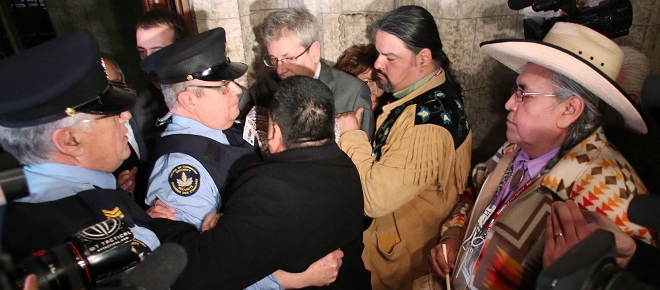Aboriginal leaders force their way into the papers
Tease the day: Yesterday’s confrontation outside the House of Commons does the trick
Chiefs and members of the First Nations try to push their way into the House of Commons and are restrained by House of Commons guards on Parliament Hill in Ottawa, Tuesday December 4, 2012. THE CANADIAN PRESS/Fred Chartrand
Share

It’s not every day that Aboriginal leaders attempt to force their way in to the House of Commons chamber. But so it was yesterday, when a group of chiefs who’d gathered at a nearby Assembly of First Nations meeting—across the river in Gatineau, Que.—marched onto Parliament Hill. They hoped to talk to someone with influence about their mounting frustration. At issue, the chiefs said, was the federal government’s lack of respect for meaningful aboriginal consultation, particularly regarding resource development. Thanks to the help of NDP MP Charlie Angus, the Aboriginal group found an audience, albeit briefly, with Natural Resources Minister Joe Oliver. It was at the conclusion of that chat that security guards blocked members of the group from entering the Commons.
There’s plenty of analysis of yesterday’s confrontation in today’s papers: notably, John Ivison in the National Post, who writes about the power First Nations can wield when it comes to energy mega-projects. Postmedia’s Christopher Curtis writes about a new alliance between the Assembly of First Nations and the Iroquois Caucus that might signal “a more combative relationship,” as Curtis writes, between Aboriginal leaders and their federal counterparts. The only insight I can offer is this: Yesterday’s confrontation outside the doors of the House was the first unpredictable thing to happen during Question Period in, well, who can even remember? That’s not an endorsement of the action, not in the least. It’s just a fact.
What’s above the fold this morning?
The Globe and Mail leads with Foreign Affairs Minister John Baird’s decision not to cut funding to Palestinians. The National Post fronts mounting frustration among aboriginal leaders when it comes to resource exploitation. The Toronto Star goes above the fold with an agreement between the NHL and its players to fund former players’ pensions. The Ottawa Citizen leads with teachers loudly protesting Ontario Premier Dalton McGuinty at an event in Ottawa. iPolitics fronts mistaken information about a deported man‘s country of birth. National Newswatch showcases a CTV News story about new security concerns swirling around Conservative MP Maxime Bernier.
Stories that will be (mostly) missed
| 1. Lab licence. A Mississauga chemical testing lab had its licence revoked by Health Canada after federal officials learned of falsified results released by Chemi Pharmaceutical. | 2. PQ patronage. Former Parti Québécois leader André Boisclair was appointed the province’s delegate general to New York as well as a different senior post in the public service. |
| 3. Demographics. Canadians who achieve less than a high school diploma work just as long—but don’t live as long—as more educated counterparts, says a new Statistics Canada study. | 4. No manslaughter. An army reservist was convicted of two charges at a court martial, including unlawfully causing bodily harm, but was found not guilty on a manslaughter charge. |